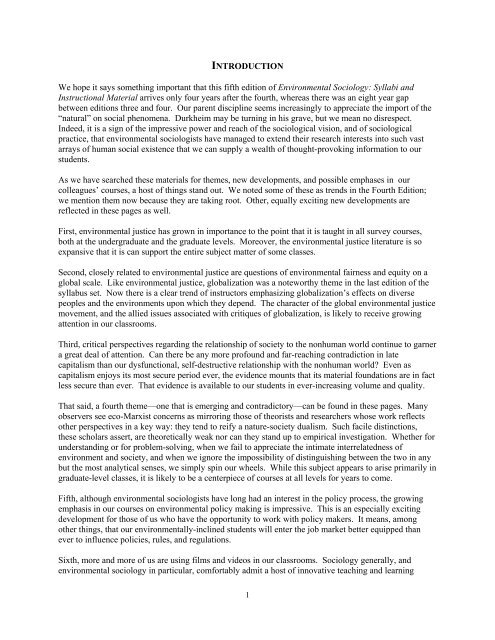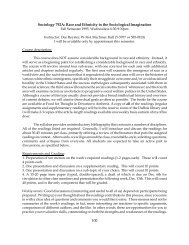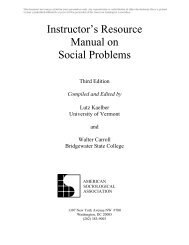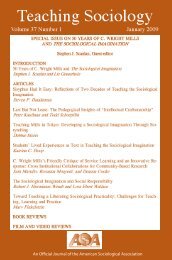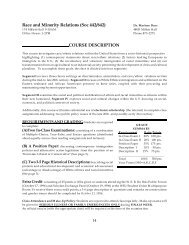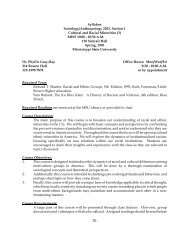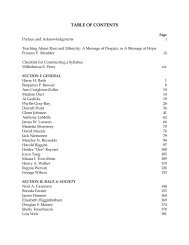Environmental Sociology - American Sociological Association
Environmental Sociology - American Sociological Association
Environmental Sociology - American Sociological Association
You also want an ePaper? Increase the reach of your titles
YUMPU automatically turns print PDFs into web optimized ePapers that Google loves.
INTRODUCTION<br />
We hope it says something important that this fifth edition of <strong>Environmental</strong> <strong>Sociology</strong>: Syllabi and<br />
Instructional Material arrives only four years after the fourth, whereas there was an eight year gap<br />
between editions three and four. Our parent discipline seems increasingly to appreciate the import of the<br />
“natural” on social phenomena. Durkheim may be turning in his grave, but we mean no disrespect.<br />
Indeed, it is a sign of the impressive power and reach of the sociological vision, and of sociological<br />
practice, that environmental sociologists have managed to extend their research interests into such vast<br />
arrays of human social existence that we can supply a wealth of thought-provoking information to our<br />
students.<br />
As we have searched these materials for themes, new developments, and possible emphases in our<br />
colleagues’ courses, a host of things stand out. We noted some of these as trends in the Fourth Edition;<br />
we mention them now because they are taking root. Other, equally exciting new developments are<br />
reflected in these pages as well.<br />
First, environmental justice has grown in importance to the point that it is taught in all survey courses,<br />
both at the undergraduate and the graduate levels. Moreover, the environmental justice literature is so<br />
expansive that it is can support the entire subject matter of some classes.<br />
Second, closely related to environmental justice are questions of environmental fairness and equity on a<br />
global scale. Like environmental justice, globalization was a noteworthy theme in the last edition of the<br />
syllabus set. Now there is a clear trend of instructors emphasizing globalization’s effects on diverse<br />
peoples and the environments upon which they depend. The character of the global environmental justice<br />
movement, and the allied issues associated with critiques of globalization, is likely to receive growing<br />
attention in our classrooms.<br />
Third, critical perspectives regarding the relationship of society to the nonhuman world continue to garner<br />
a great deal of attention. Can there be any more profound and far-reaching contradiction in late<br />
capitalism than our dysfunctional, self-destructive relationship with the nonhuman world? Even as<br />
capitalism enjoys its most secure period ever, the evidence mounts that its material foundations are in fact<br />
less secure than ever. That evidence is available to our students in ever-increasing volume and quality.<br />
That said, a fourth theme—one that is emerging and contradictory—can be found in these pages. Many<br />
observers see eco-Marxist concerns as mirroring those of theorists and researchers whose work reflects<br />
other perspectives in a key way: they tend to reify a nature-society dualism. Such facile distinctions,<br />
these scholars assert, are theoretically weak nor can they stand up to empirical investigation. Whether for<br />
understanding or for problem-solving, when we fail to appreciate the intimate interrelatedness of<br />
environment and society, and when we ignore the impossibility of distinguishing between the two in any<br />
but the most analytical senses, we simply spin our wheels. While this subject appears to arise primarily in<br />
graduate-level classes, it is likely to be a centerpiece of courses at all levels for years to come.<br />
Fifth, although environmental sociologists have long had an interest in the policy process, the growing<br />
emphasis in our courses on environmental policy making is impressive. This is an especially exciting<br />
development for those of us who have the opportunity to work with policy makers. It means, among<br />
other things, that our environmentally-inclined students will enter the job market better equipped than<br />
ever to influence policies, rules, and regulations.<br />
Sixth, more and more of us are using films and videos in our classrooms. <strong>Sociology</strong> generally, and<br />
environmental sociology in particular, comfortably admit a host of innovative teaching and learning<br />
1


